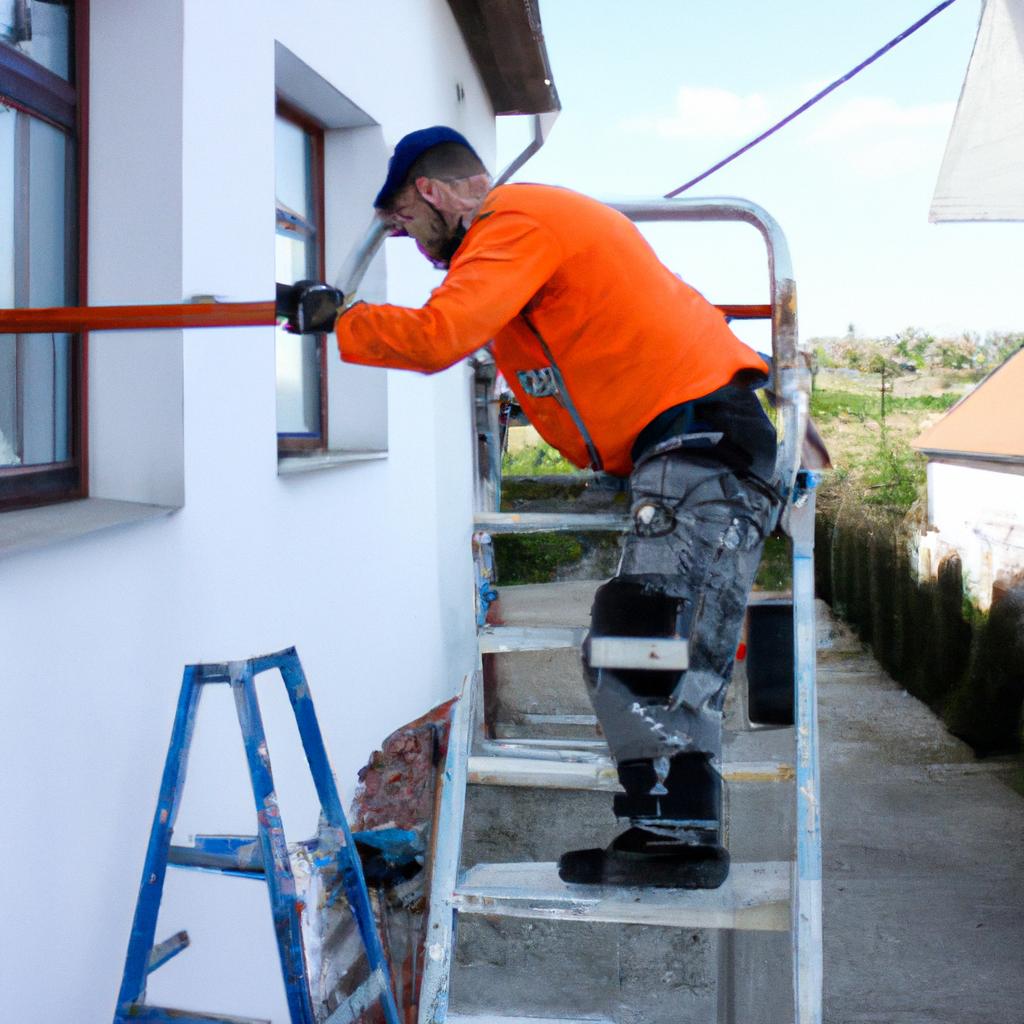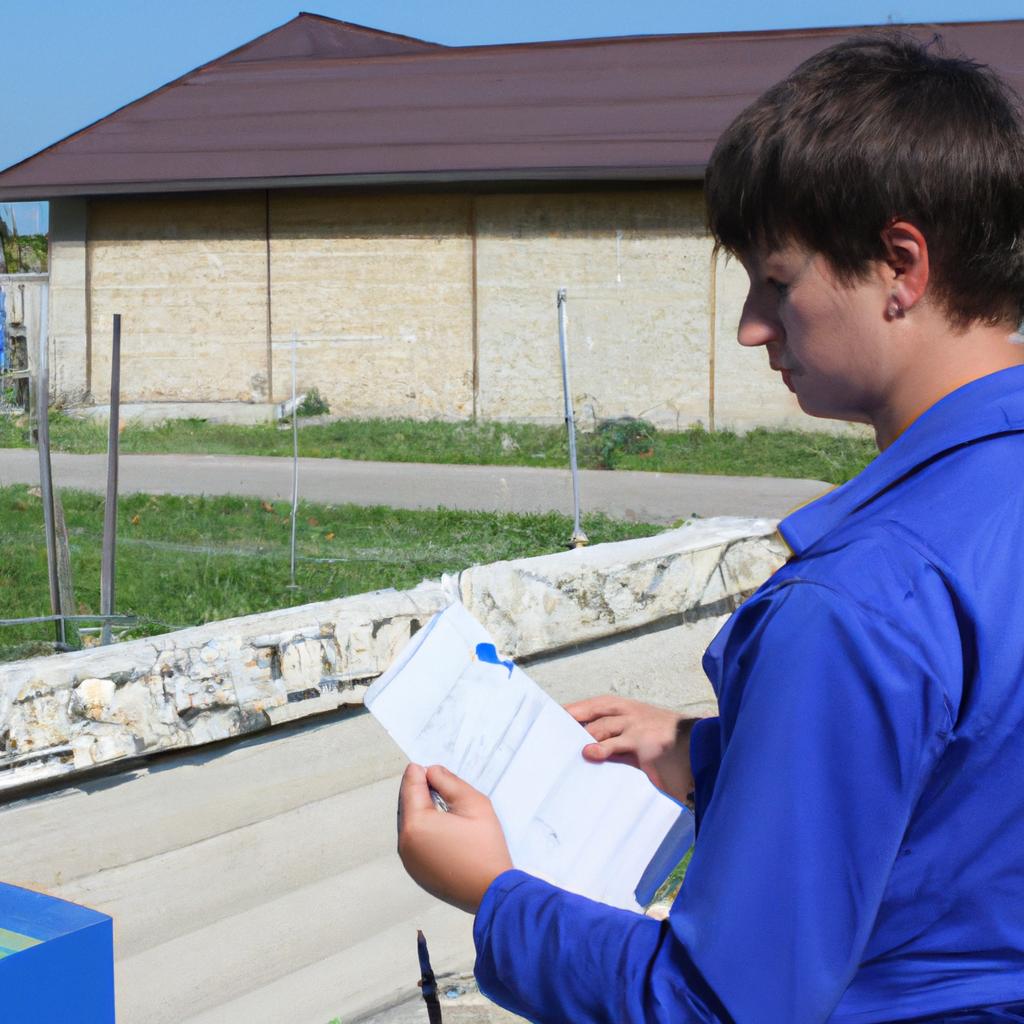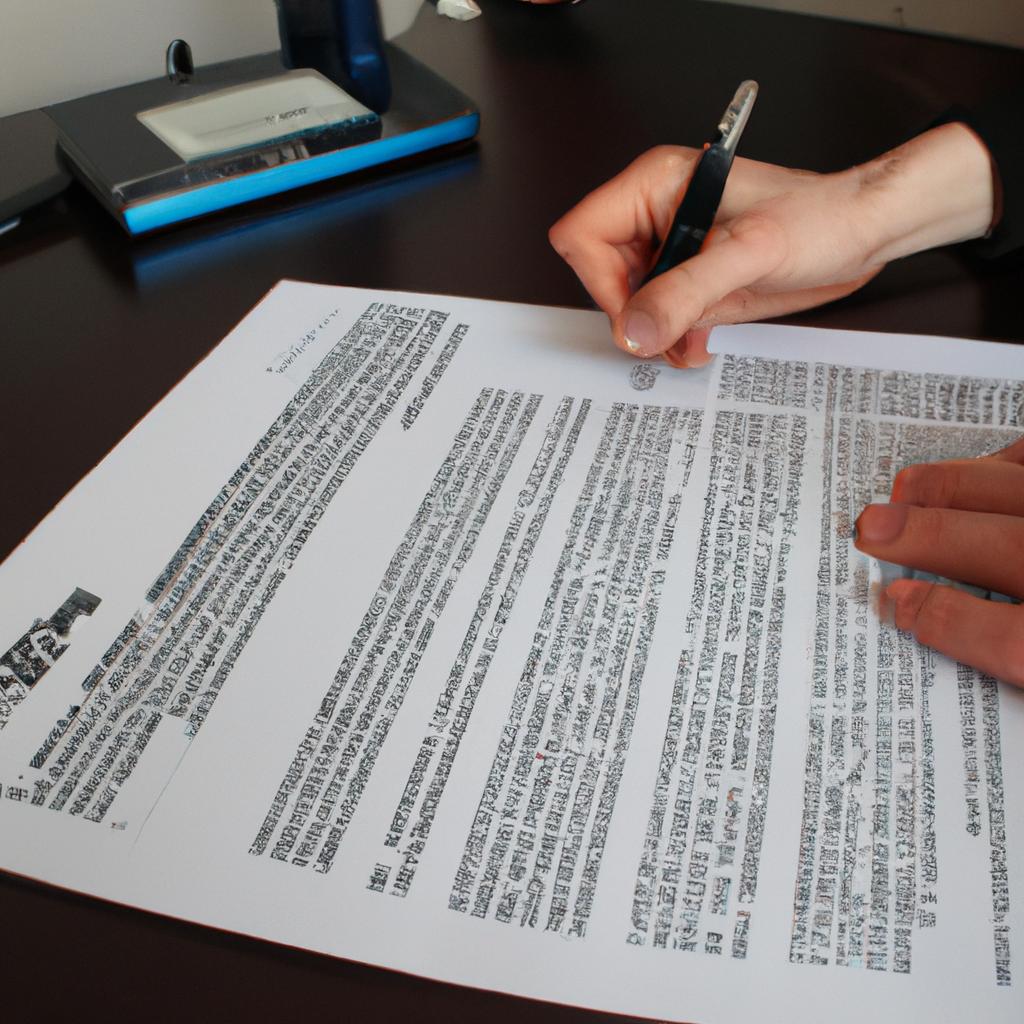The maintenance and repair of properties play a vital role in the real estate business, ensuring that buildings are kept in optimal condition and providing a safe and comfortable environment for tenants. Property management professionals must navigate various challenges when it comes to maintaining and repairing properties efficiently and cost-effectively. For instance, consider the case of an apartment complex experiencing frequent plumbing issues. Without proper maintenance and repairs, such as fixing leaky pipes or clogged drains promptly, tenants may face inconveniences, leading to dissatisfaction and potential vacancies.
To successfully manage maintenance and repairs in the real estate industry, property managers need to possess essential knowledge and skills related to identifying problems, prioritizing tasks, coordinating with vendors, budgeting effectively, and implementing preventive measures. This article aims to serve as a comprehensive guide for property management professionals by providing insights into best practices for handling maintenance issues. By understanding these principles and incorporating them into their daily operations, property managers can ensure the longevity of their assets while simultaneously meeting tenant expectations.
In the following sections, we will explore key strategies for managing maintenance requests efficiently through effective communication channels between tenants and property managers. Additionally, this article will delve into preventive maintenance techniques aimed at minimizing future repair costs. Furthermore, we will examine ways to address emergency situations promptly without compromising tenant safety and satisfaction. Lastly, we will discuss the importance of regular inspections to identify potential maintenance issues before they escalate.
-
Efficient Communication Channels:
Property managers should establish clear communication channels with tenants to receive and prioritize maintenance requests effectively. This can be done through various means such as phone calls, emails, or online portals. Timely responses to these requests are crucial to demonstrate attentiveness and maintain tenant satisfaction. -
Prioritizing Maintenance Tasks:
It is essential for property managers to prioritize maintenance tasks based on urgency and impact on tenant comfort and safety. Categorizing repair requests into different levels of priority can help ensure that critical issues are addressed promptly while also managing resources efficiently. -
Coordinating with Vendors:
Establishing strong relationships with reliable vendors is key to efficient property maintenance. Property managers should have a network of trusted contractors who are readily available to handle repairs promptly and at competitive prices. Regularly reviewing vendor performance and seeking feedback from tenants after repairs can help ensure quality service delivery. -
Effective Budgeting:
Property managers must develop a comprehensive budget for maintenance expenses, including both routine upkeep and unexpected repairs. Allocating sufficient funds for preventive maintenance measures can significantly reduce future repair costs by addressing small issues before they worsen. -
Preventive Maintenance:
Implementing preventive maintenance strategies can save property managers time, money, and tenant frustrations in the long run. This includes conducting regular inspections, cleaning gutters, servicing HVAC systems, testing smoke alarms, checking plumbing fixtures, and more. -
Handling Emergency Situations:
Emergency situations such as floods or electrical failures require immediate attention to ensure tenant safety and minimize damage to the property. Property managers should have protocols in place to handle emergencies swiftly, including having access to emergency contact information for relevant vendors or service providers. -
Regular Inspections:
Regular property inspections allow property managers to proactively identify potential maintenance issues before they become major problems. Inspections can be scheduled at specific intervals or conducted in response to tenant complaints. Addressing maintenance concerns promptly will help maintain tenant satisfaction and prevent further damage.
In conclusion, effective maintenance and repair management is vital for property managers to ensure the longevity of their assets and provide a safe and comfortable environment for tenants. By implementing efficient communication channels, prioritizing tasks, coordinating with vendors, budgeting effectively, implementing preventive measures, handling emergencies promptly, and conducting regular inspections, property managers can successfully navigate maintenance challenges in the real estate industry.
Importance of Regular Maintenance
Importance of Regular Maintenance
Maintaining a property is crucial in the real estate business to ensure its long-term value and functionality. Regular maintenance not only enhances the overall aesthetics but also prevents potential issues from escalating into costly repairs. For instance, consider a hypothetical scenario where an apartment building neglects routine maintenance for years. As a result, the roof starts leaking during heavy rain, causing extensive damage to multiple units and leading to significant financial burdens for both the tenants and the property owner.
To fully grasp the significance of regular maintenance, let us explore some key reasons why it should be prioritized:
-
Preservation of Property Value: By consistently performing upkeep tasks such as painting, landscaping, and general cleaning, property owners can maintain or even increase their property’s market value. A well-maintained property attracts potential buyers or tenants who are willing to pay higher prices due to its appealing appearance and functionality.
-
Prevention of Costly Repairs: Proactively identifying small problems before they escalate can save property owners substantial amounts of money in repair costs. Conducting regular inspections allows professionals to detect issues like plumbing leaks or electrical malfunctions early on, preventing them from becoming major problems that require expensive fixes.
-
Enhancement of Safety and Comfort: Regular maintenance ensures that all safety features within a property remain functional. This includes checking fire alarm systems, security cameras, elevators, and emergency exits regularly. Additionally, addressing minor inconveniences promptly—such as repairing broken windows or malfunctioning HVAC systems—ensures optimal comfort for occupants.
-
Reduction in Tenant Turnover: Consistent maintenance efforts contribute significantly to tenant satisfaction levels. When residents experience fewer disruptions due to timely repairs and improvements, they are more likely to renew their leases and recommend the property to others seeking accommodation.
To further illustrate this point visually:
| Benefits of Regular Maintenance |
|---|
| Preservation of Property Value |
| Prevention of Costly Repairs |
| Enhancement of Safety and Comfort |
| Reduction in Tenant Turnover |
The importance of regular maintenance cannot be overstated. It not only preserves property value but also prevents costly repairs, enhances safety and comfort, and reduces tenant turnover—a win-win situation for both property owners and occupants.
Moving forward to the next section on “Common Repairs in Real Estate,” we will delve into specific issues that frequently arise within properties and require prompt attention.
Common Repairs in Real Estate
Transitioning from the importance of regular maintenance, let us now delve into common repairs that are often encountered in the real estate industry. To illustrate this further, consider a hypothetical scenario where a property management company oversees an apartment complex. One day, they receive complaints from multiple tenants about leaky faucets and malfunctioning air conditioning units. These issues not only inconvenience the residents but also affect their overall satisfaction with their living environment.
When it comes to common repairs in real estate, there are several areas that property managers need to address promptly:
-
Plumbing Issues:
- Leaky faucets
- Clogged drains
- Burst pipes
- Faulty water heaters
-
Electrical Problems:
- Power outages
- Malfunctioning switches and outlets
- Wiring issues
- Tripped circuit breakers
-
HVAC (Heating, Ventilation, and Air Conditioning) Troubles:
- Inadequate heating or cooling
- Uneven temperature distribution
- Filter replacements and cleaning needs
- Thermostat malfunctions
-
Structural Maintenance:
- Roof leaks or damage
- Cracks in walls or ceilings
- Foundation problems
- Window and door repairs/replacements
Addressing these common repair issues is essential for maintaining a safe and comfortable living space for tenants while preserving the value of the property itself. Neglecting such repairs can lead to increased costs in the long run as minor issues escalate into more significant problems.
In order to effectively manage repairs, property managers should create a comprehensive maintenance schedule that outlines routine inspections and preventive measures. By proactively addressing potential concerns before they become major repairs, property owners can save time, money, and ensure tenant satisfaction.
Moving forward, we will explore how property managers can create an effective maintenance schedule to stay on top of regular upkeep and minimize the occurrence of common repairs.
Creating a Maintenance Schedule
In managing a real estate property, it is crucial to address common repairs promptly and prioritize regular maintenance. By doing so, property owners can ensure the longevity and value of their investment. Let’s consider an example to illustrate the significance of this practice. Imagine a residential complex with aging plumbing infrastructure that has not been properly maintained over time. Residents begin experiencing frequent water leaks and pipe bursts, leading to costly emergency repairs and inconveniences for both tenants and management.
To avoid such scenarios, implementing a well-structured maintenance schedule becomes essential. Here are some key areas where proactive attention can prevent more significant problems:
-
Plumbing Systems:
- Regular inspection of pipes, valves, faucets, and toilets
- Fixing minor leaks or drips promptly
- Ensuring proper drainage systems
-
Electrical Systems:
- Periodic checks on wiring connections, switches, outlets, and circuit breakers
- Replacing faulty electrical components immediately
- Testing safety devices like smoke detectors regularly
-
HVAC Systems:
- Routine cleaning of filters and vents
- Checking thermostat functionality
- Conducting annual inspections by professionals for optimal performance
-
Structural Integrity:
- Regular examination of roofs for any signs of damage or leakage
- Inspecting walls, floors, windows, doors for cracks or decay
- Treating pest infestations timely to prevent further deterioration
Addressing these aspects through systematic maintenance ensures tenant satisfaction while protecting the property owner’s investment.
Furthermore, understanding the connection between prompt repairs/maintenance actions and financial savings is vital. Consider the following table showcasing potential costs associated with deferred maintenance versus those incurred when addressing issues proactively:
| Deferred Maintenance | Proactive Maintenance | |
|---|---|---|
| Repair Costs | Higher | Lower |
| Tenant Retention | Decreased | Increased |
| Property Value | Decreased | Maintained/Increased |
| Maintenance Expenses | Higher | Lower |
By prioritizing regular maintenance, property owners can minimize repair costs over time, increase tenant satisfaction and retention, maintain or enhance the property’s value, and effectively manage their expenses.
In the subsequent section, we will explore the importance of hiring qualified contractors for executing repairs and maintenance tasks. This ensures that the work is done efficiently and up to industry standards.
Hiring Qualified Contractors
Having established the importance of creating a maintenance schedule, let us now delve into the crucial aspect of hiring qualified contractors to carry out necessary repairs and maintenance tasks in your real estate business.
To ensure that the maintenance and repair needs of your properties are met efficiently, it is essential to engage experienced and reliable contractors. Let’s consider an example scenario where a property owner notices a water leak issue in one of their rental units. In this case, they need to find a contractor who specializes in plumbing repairs and has a proven track record of resolving similar issues promptly.
When selecting contractors for your real estate business, keep in mind the following key factors:
- Reputation: Look for contractors with positive reviews from previous clients. This can be done by checking online platforms or seeking recommendations from other property owners or managers.
- Expertise: Hire professionals who possess the specific skills required for each task. For instance, if you need roof repairs, seek out contractors experienced in roofing rather than general handymen.
- Licensing and Insurance: Ensure that any potential contractor holds valid licenses and insurance coverage. This protects both parties involved in case of accidents or damages during the repair process.
- Cost Estimates: Obtain detailed cost estimates from multiple contractors before making a decision. Consider not only the overall price but also the breakdown of expenses such as labor, materials, and any additional charges.
Emphasizing these considerations will help you make informed decisions when choosing qualified contractors who align with your business goals and requirements.
Table Example:
| Contractor | Reputation | Expertise | Licensing & Insurance | Cost Estimates |
|---|---|---|---|---|
| ABC Plumbing | ⭐⭐⭐⭐ | Plumbing | ✅ | $500 |
| XYZ Handyman | ⭐⭐ | General | ❌ | $300 |
| DEF Roofing | ⭐⭐⭐⭐⭐ | Roofing | ✅ | $800 |
| GHI Electric | ⭐⭐ | Electrical | ✅ | $400 |
By taking into account these factors and analyzing the table above, you can make an informed decision when selecting contractors for your real estate business.
Looking beyond hiring qualified contractors, another crucial aspect of effective property management is budgeting for repairs.
Budgeting for Repairs
Section Title: “Ensuring Quality Repairs within Budget”
Transitioning smoothly from the previous section on hiring qualified contractors, it is essential for property managers to carefully budget their repairs and maintenance expenses. By doing so, they can ensure that necessary repairs are completed promptly while staying within financial constraints. Let us explore some key considerations when budgeting for repairs in real estate management.
To illustrate these considerations, consider a hypothetical scenario where a property manager oversees an apartment complex with multiple units. One of the units experiences a plumbing issue due to outdated pipes, requiring immediate attention. In this case, the property manager must evaluate the cost implications of repairing or replacing the pipes while considering the impact on overall cash flow.
When developing a repair budget, property managers should keep the following factors in mind:
- Property Age and Condition: Older properties may require more frequent and extensive repairs compared to newer ones. Conducting regular inspections will help identify potential issues early on and allocate funds accordingly.
- Emergency Reserves: Maintaining a separate emergency fund ensures sufficient resources are available for unexpected repairs or urgent situations.
- Prioritization: Prioritize repairs based on urgency and potential consequences if left unaddressed. Address critical safety concerns first before focusing on cosmetic enhancements.
- Contractor Quotes: Obtain detailed quotes from reliable contractors to estimate repair costs accurately.
Consider a table summarizing different categories of repair expenditures as part of effective budget planning:
| Category | Description | Emotional Response |
|---|---|---|
| Safety-related | Repairs addressing hazards posing risks to tenants | Ensuring resident well-being |
| Functional | Fixes improving functionality of various systems | Enhancing quality of living |
| Aesthetic | Cosmetic updates enhancing visual appeal | Creating attractive spaces |
| Preventive Maintenance | Regular upkeep reducing chances of major breakdowns | Minimizing future disruptions |
In summary, effective budgeting for repairs in real estate management requires careful consideration of property age, emergency reserves, repair prioritization, and contractor quotes. By allocating funds strategically and planning ahead, property managers can ensure quality repairs are carried out within the available budget.
With a solid understanding of repair budgeting discussed above, let us now delve into useful tips for efficiently managing property maintenance tasks.
Tips for Efficient Maintenance
In the previous section, we discussed the importance of budgeting for repairs in property management. Now, let’s delve into some practical tips and strategies that can help real estate businesses effectively allocate funds for maintenance and repairs.
To illustrate these concepts, let’s consider a hypothetical case study involving an apartment complex with 100 units. The property manager has noticed several recurring issues such as leaky faucets, malfunctioning HVAC systems, and worn-out carpets. By analyzing historical data and conducting thorough inspections, they have estimated the following repair costs per unit annually:
- Plumbing repairs: $200
- HVAC system maintenance: $300
- Carpet replacements: $150
Based on this information, here are four key considerations to keep in mind when budgeting for repairs:
- Regular Inspections: Conduct routine inspections to identify potential problems early on before they escalate into larger issues. This proactive approach allows you to plan and budget accordingly.
- Prioritize Essential Repairs: Categorize repairs based on their urgency and impact on tenant satisfaction and safety. Address critical repairs promptly while considering less urgent ones over a longer timeframe.
- Allocate Contingency Funds: Set aside a portion of your overall maintenance budget for unexpected or emergency repairs. Having contingency funds readily available will prevent financial strain or delays in addressing urgent matters.
- Consider Age and Condition: Take into account the age of various building components (e.g., plumbing fixtures) and their expected lifespan when estimating repair costs. Older properties may require more frequent maintenance compared to newer ones.
The table below summarizes the annual repair costs for our hypothetical case study:
| Repair Category | Estimated Cost per Unit |
|---|---|
| Plumbing | $200 |
| HVAC | $300 |
| Carpets | $150 |
By incorporating these cost estimates along with other relevant factors specific to your property, you can create a comprehensive budget that accounts for the necessary repairs and ensures the long-term well-being of your real estate investment.
In summary, effective budgeting for repairs in property management involves regular inspections, prioritization of essential repairs, allocation of contingency funds, and consideration of factors like age and condition. By adopting these strategies, real estate businesses can ensure proper maintenance while minimizing unforeseen expenses.




